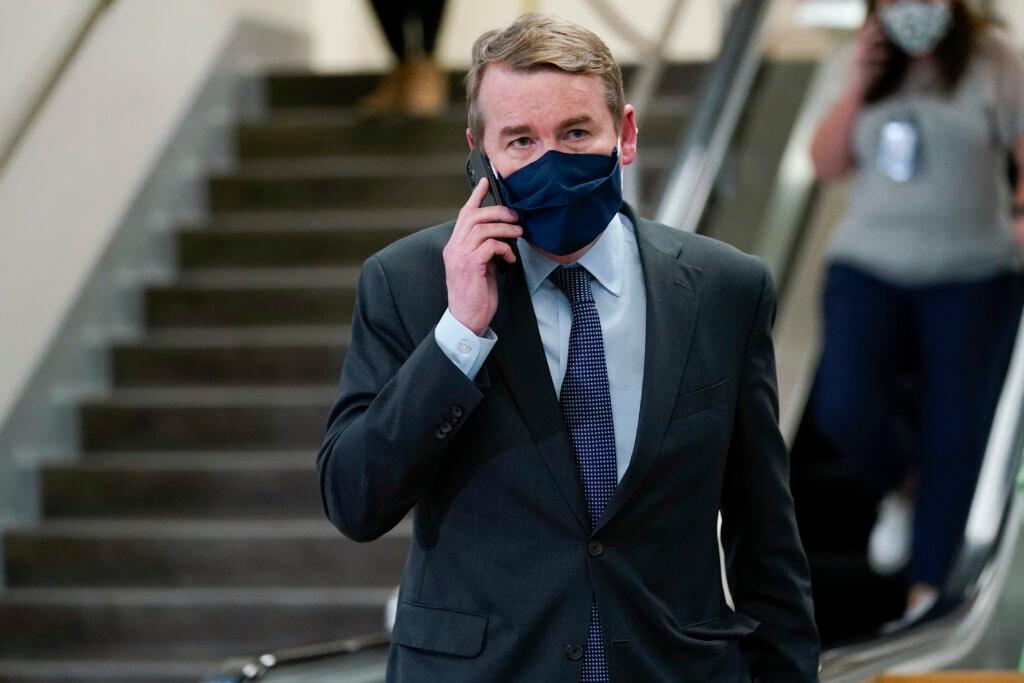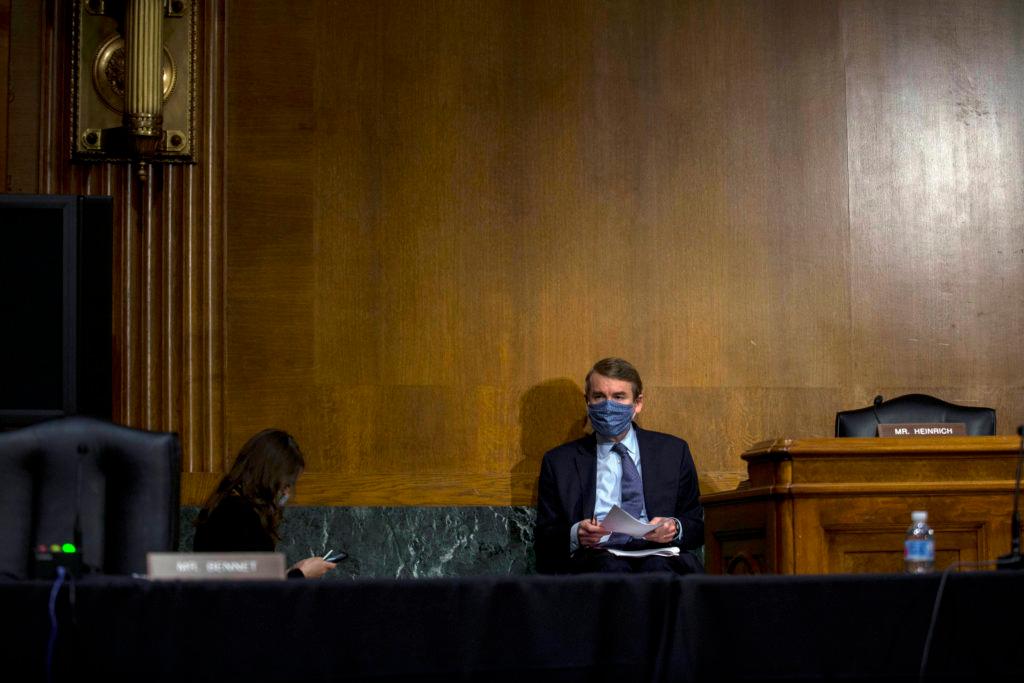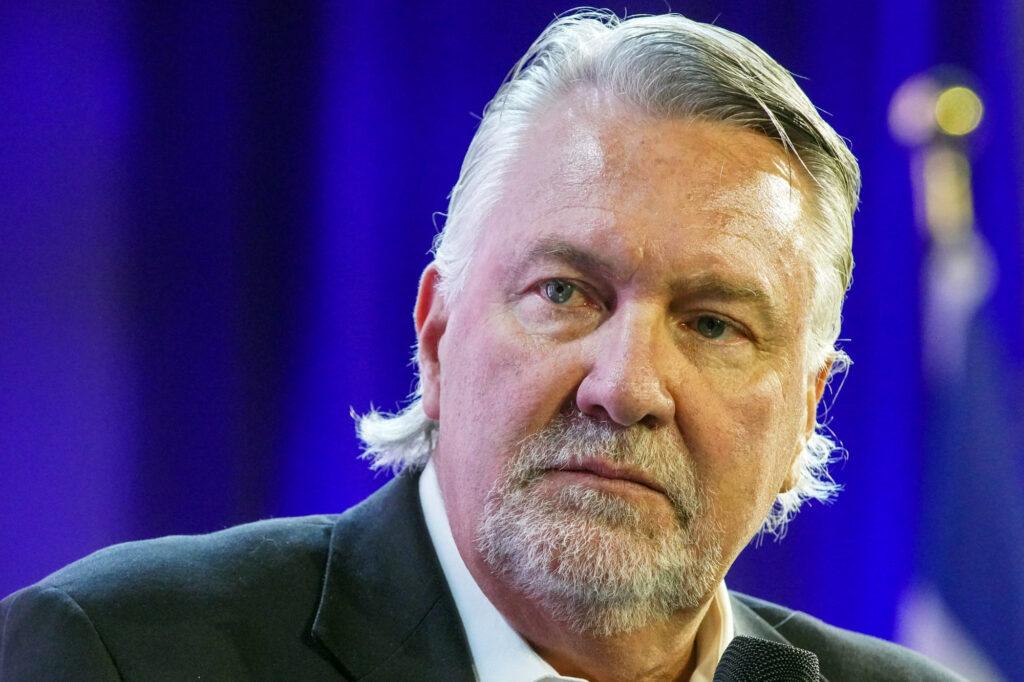
Democrat Michael Bennet’s 13-year tenure in the Senate has been anything but flashy. When it comes to social media, he’s not there to “own” the right or call people “snowflakes.”
“That's why I have fewer Twitter followers than some other people that are willing to do that kind of stuff,” Bennet said.
His big viral moment came in 2019 during a partial government shutdown, when Bennet accused Republican Sen. Ted Cruz of Texas of shedding “crocodile tears” for the pain the closure was causing. Cruz had also helped lead a 2013 shutdown at a time when Colorado was struggling with devastating flooding.
But in general, the senior senator from Colorado doesn't see the point of piling on.
“I don't think chasing every single Twitter controversy is going to benefit the kids I used to work for in the Denver Public Schools or kids who live in rural Colorado.”
Bennet, whose first public position was as superintendent of DPS, has continued to make children’s issues, poverty in particular, central to his political focus, most recently with his drive for an expanded Child Tax Credit.
He said that’s what’s motivating him to seek a third term in the Senate. He’ll make his case to Colorado voters from now until Nov. 8 that, despite the economic headwinds the country is facing, a Democratic agenda that has stalled in Congress and a partisan political environment, he has championed the state and should be re-elected.
“I feel lucky to have the record that I’m running on in Colorado. I think it’s a record that will hold up in this election,” he said.

From a global childhood to the halls of Congress
Compared to many, Bennet had a rarefied upbringing. He was born in India, while his father was an aide to the U.S. Ambassador there at the time. His father went on to become head of the U.S. Agency for International Development, an Assistant Secretary of State, and even led National Public Radio for a time.
Bennet graduated from St. Albans, a private all-boys school in Washington, D.C. (whose alumni include Al Gore, John Warner and Brit Hume), Wesleyan University, where his father also served as president after Bennet graduated, and Yale Law School.
He moved to Colorado in the late 1990s and worked at the Anschutz Investment Company before Denver’s then-mayor John Hickenlooper brought him on as chief of staff for two years. In 2005, he was hired as superintendent of DPS and saw first-hand the struggles families had climbed the economic ladder. And it was that perspective that he brought to the Senate when he was first appointed to replace Sen. Ken Salazar in 2009.
Bennet was something of a surprise pick at the time, given that he’d never held elected office before. The state GOP dubbed him the “accidental senator” — a slight he now embraces in fundraising emails.
Bennet eked out a slim victory over Republican Ken Buck — then the Weld County District Attorney — in his 2010 race to hold the seat. His win was a rare bright spot for Democrats in a year that otherwise saw them lose seats to the Tea Party wave.
But Bennet didn’t have much luck in his highest-profile race — a run for president in 2020. After recovering from prostate cancer, he announced his candidacy in May 2019 with a focus on economic prosperity and education. He joined a crowded field, and didn’t gain much traction. He dropped out after getting less than one percent of the vote in the New Hampshire primary.
But he said that experience taught him a couple of valuable things.
“I think Colorado is basically where the country is politically,” he said. “It’s a country that reflects the kind of politics of Colorado… and that was an interesting and reassuring thing to learn.”
It also reinforced what he says he’s always tried to do in office — to say the same thing whether he’s in an election cycle or not, whether it’s the primary or the general, whether he’s in rural Colorado or metro Denver. He said that takes discipline, and argues the positions he took in his presidential run are basically the same as the ones he’s campaigning on now.

The big picture
As he gears up to fight for a third term, the 57-year-old Denver resident said he’s focused on big picture issues like the state of American democracy and how to address the lack of economic mobility for working-class families.
Spend any time with Bennet on the campaign trail and you’ll hear him say, probably more than once, that what he wants to see and do is create an economy that “when it grows, it grows for everybody, not just the people at the very top.”
“I just don't accept that we somehow have to accept, for our children and our grandchildren, a diminished expectation of what their opportunity looks like,” he said. “And I don't accept that we can't strengthen this democracy in very fundamental ways to pass something off to the next generation of Americans that we're proud of.”
If it sounds old-school, that’s because in many ways Bennet is old school. He’s not constantly on social media, he doesn’t have a gaggle of reporters following him around the Capitol and he’s not pushing out bills about the flashpoint issue of the day.
For the most part, Bennet has spent his last two terms building a legislative record as a moderate. He said he looks for opportunities to work with Democrats and Republicans to get bills “over the finish line.” He points to legislation like the Farm Bill, for which he’s held listening sessions in rural Colorado, the recent bipartisan infrastructure package, and a bill to speed up the development of advanced therapies for rare diseases as examples of that success.
Bennet also took advantage of the return of congressionally directed funding, better known as earmarks, to deliver more than $121 million in funds to communities across the state.
But it has been a challenge for Bennet to get his more ambitious priorities passed. A prime example of that is the CORE Act to protect hundreds of thousands of acres of federal land in western Colorado. He’s been championing elements of the current bill for years. While Rep. Joe Neguse has managed to get it passed in the House, it hasn’t cleared a Republican or Democratic-controlled Senate yet.
Bennet’s push for a public healthcare option, Medicare-X, which he talked about during his failed presidential run, also hasn’t advanced in the Senate. And early in his Senate career, he was part of a bipartisan group of senators that tried and failed to get a comprehensive immigration reform bill across the line (it passed the Senate but stalled in the House). He also worked on a 2018 bill to extend protections for DREAMers (that group also included then GOP Sen. Cory Gardner) that didn’t have Trump’s support and failed to get 60 votes in the Senate
Most recently, he’s seen an idea he’s been pushing for years come to fruition, only to have it expire: the expanded Child Tax Credit. This is the topic where Bennet takes on a strong progressive bent. In the limited time it was in effect and providing a monthly income bump for families with children, researchers found the credit helped reduce hunger, lifted some kids out of poverty and provided working and middle-class families a welcome financial cushion. It did exactly what it was supposed to, in Bennet’s view. But it’s also the kind of idea that many Republicans argue is a handout, not a hand-up.
Bennet has been critical of his party for not acting to roll back the Trump tax cuts for the very wealthy or to continue the extended Child Tax Credit.
“I believe very strongly that the Democratic Party didn't fight hard enough to extend the Child Tax Credit,” he said, which was dropped from the reconciliation package, known as Build Back Better, even before West Virginia Sen. Joe ManchinDemocrat scuttled the package altogether. “I fought for it, I think, as hard as I knew how to fight for it, and I'm continuing to fight for it now to make it permanent.”
Despite his complaints about the party, Bennet is already under fire from Republicans for his political closeness to President Biden.
“Michael Bennet has been Biden’s wingman at every turn. Bennet votes with Biden 100 percent of the time,” said GOP Senate candidate Joe O’Dea in his acceptance speech on primary night. “Look, I love my wife Celeste more than life itself. But I don’t even agree with her 100 percent of the time.

Democratic headwinds
The Cook Political Report has Colorado’s Senate race as a likely Democratic seat, but O’Dea’s win has at least one analyst forecasting a tougher contest. Bennet goes into the race with almost $7 million in campaign cash, far more than O’Dea has on hand.
Bennet is realistic about the headwinds Democrats, including himself, face ahead of November. “Even before we had inflation that's so tough for families in Colorado,” Bennet said, “We were dealing with dramatic increases in the cost of things like housing, healthcare, higher education and early childhood education.”
But he makes the case that “over the years, I've supported policies that would address every single one of those things.”
Bennet said he plans to keep doing what he’s always done, which is to show up across the state, and not just in election years. “One thing I really love about this job is I feel at home literally everywhere. And whether people voted for me or not, some of the conversations that I've had over the years that I've enjoyed the most are ones where I'm in a Republican area and people say, ‘well, you know, we thought you were a complete Bolshevik, but it turns out there's some stuff we agree on.’”
He also argues O’Dea is “too far outside the mainstream of Colorado to beat my record and to beat me,” noting he’s said he would confirm conservative judges, supported former President Trump, and opposed the recently passed bipartisan gun bill.
The Supreme Court’s ruling overturning Roe-vs-Wade means that abortion could also become a significant issue in the race. Bennet supports a federal law legalizing abortion nationally, and he doesn’t think it should be dismissed just as a cultural divide issue.
“I think what we're talking about here is a fundamental constitutional right that's been here for 50 years. And we're gonna have to figure (things) out through the political process, now that the court has apparently taken a different view,” he said. “We have to fight very hard to make sure that we've got pro (legal abortion) majorities in the Senate, in the House and legislatures all across the country.”
While he sounds a confident note about his reelection chances, a couple of Democratic-aligned groups had hoped to pave an easier path for him.
Outside groups poured millions of dollars into ads to boost the farther right candidate, Ron Hanks, in the primary, to no success. Many in the political sphere believe O’Dea will be a much tougher candidate to beat. Bennet said that the PAC behind that effort “is not affiliated with my campaign.” Unlike Hanks, O’Dea has been clear that he believes the 2020 election was fairly decided.
Bennet, who along with his colleagues was in the Senate chamber on Jan. 6, believes “democracy is on the ballot this fall” as voters decide whether to hand Republicans back control of Congress. And he said that means electing people committed to strengthening democratic institutions.
It’s an issue that’s personal to Bennet. His mother and maternal grandparents survived the Holocaust and immigrated to the United States to rebuild their lives.
“We may not win every political race, but I think this is a fight worth having and it’s a fight worth winning,” he said. “And I think in the end, we will save democracy.”









